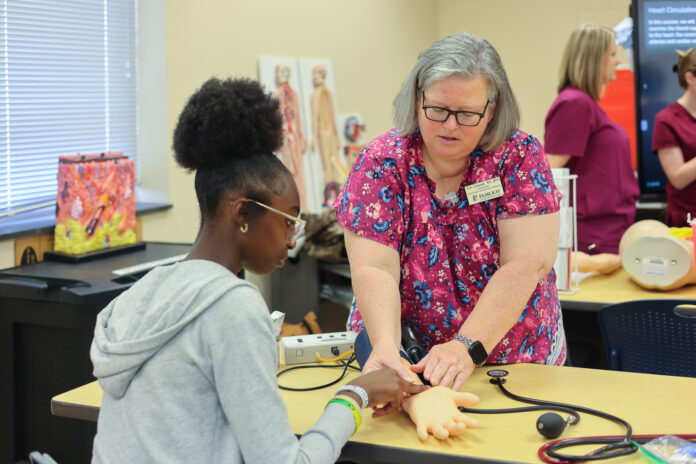When I began my career as an economic developer in rural North Carolina in the late 1990s, our focus was to attract businesses, secure investments, and create jobs. Successfully recruiting a major manufacturing plant felt like winning an ACC championship, with celebrations and ribbon cuttings marking our achievements.
But many of those victories turned out to be short-lived. Like teams that celebrate a big win only to miss the next season’s tournament, some companies we landed soon moved overseas or downsized, leaving behind empty industrial parks and unmet expectations. We came to understand that true economic resilience isn’t built on one-time wins or outside funding alone — it requires the kind of steady, homegrown development that can sustain a full season, not just a single game.
Today, North Carolina’s workforce strategies have evolved beyond traditional industry recruitment. Gov. Josh Stein’s establishment of the Council on Workforce and Apprenticeships highlights the critical role community colleges play in aligning educational programs with workforce demands. It’s a promising step toward strengthening the state’s talent pipeline. For rural communities, the opportunity now is to build on this momentum by tailoring strategies that not only meet high-demand workforce needs but also prioritize training for careers that support local ownership, entrepreneurship, and long-term community investment.
Chris Estes, co-executive director of the Aspen Institute Community Strategies Group, emphasized this point at this year’s North Carolina Rural Summit, underscoring the importance of local equity and robust economies built around numerous small, locally owned businesses. My experience supports this view: long-term rural prosperity results from significant investments in skills that anchor residents to their communities and existing industries.
Having a diverse array of local businesses and entrepreneurs often offers greater economic stability compared to reliance on a single large employer. Additionally, when local residents actively participate and hold ownership stakes, community vitality and resilience significantly improve. Training for existing local industries and supporting entrepreneurship are complementary strategies. Both strengthen rural economies by building talent pipelines that meet essential community needs without relying solely on outside recruitment.
Prioritizing essential, transferable skills
Certain occupations inherently support community stability by addressing critical everyday needs. Skilled trades such as HVAC, plumbing, welding, carpentry, and electrical work offer stable employment opportunities resistant to outsourcing or automation. Professionals in these fields frequently establish local businesses, actively contributing as community leaders. Similarly, health care careers, particularly nursing, directly fulfill local needs and enhance community resilience.
Local success stories
In Pitt County, the Tradesformers program illustrates how partnerships among schools, community colleges, and local industries effectively prepare students for careers in skilled trades. The program provides comprehensive training, combining classroom instruction with paid apprenticeships that lead directly to local employment opportunities.
Another successful model, the Surry-Yadkin Works initiative, unites four school systems with Surry Community College, offering extensive work-based learning. Through apprenticeships, job shadowing, and specialized programs, students gain practical skills aligned directly with regional industry needs in manufacturing and healthcare.
STEM East’s Industry in Schools program emphasizes targeted workforce strategies by connecting students in eastern North Carolina to careers in biopharma, aerospace, energy, and advanced manufacturing. These sectors, strategically aligned with regional industry clusters, provide relevant training that supports existing local employment opportunities.
Sign up for Awake58, our newsletter on all things community college.
Building rural talent pipelines
Sustained rural economic development relies on two foundational pillars. First, communities need training programs that develop essential, transferable skills — such as plumbing, nursing, and the skilled trades — that serve everyday local needs. Second, success depends on strong collaboration among local industries, K-12 schools, and community colleges to ensure that educational efforts are aligned with real-world employment and entrepreneurial opportunities.
These community-anchored skills not only create stable employment but also open pathways for residents to launch their own businesses, strengthening both economic self-sufficiency and local ownership.
Robust cross-sector partnerships enhance these outcomes by aligning education with employment and entrepreneurship, creating clearer pipelines from classroom to career. Further, to ensure these pipelines remain responsive and relevant, communities must also make data-informed decisions. Using local and regional labor market data to shape training priorities helps community colleges stay aligned with evolving workforce needs while reinforcing existing regional industry clusters.
Ultimately, by empowering residents through practical skills training, fostering dynamic educational-industry partnerships, and leveraging data-driven insights, rural North Carolina can establish and maintain a resilient economic foundation.
At the Belk Center, we are committed to exploring these strategies further through ongoing research and upcoming workforce development briefs. These resources will identify best practices, highlight key opportunities, and provide actionable strategies to drive sustained rural prosperity.
Behind the Story
The author used Grammarly and ChatGPT to edit a section of this article and used ChatGPT for research.
